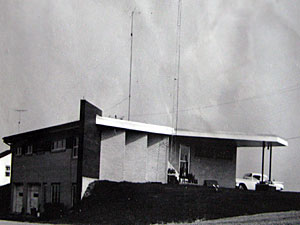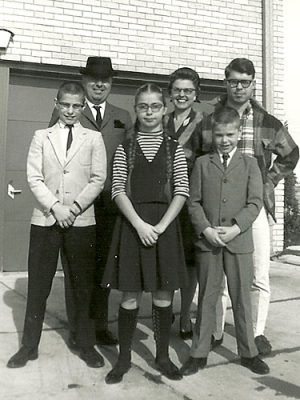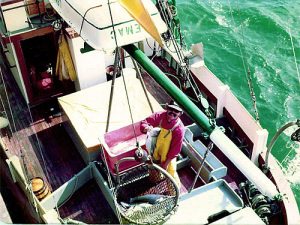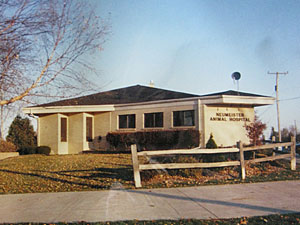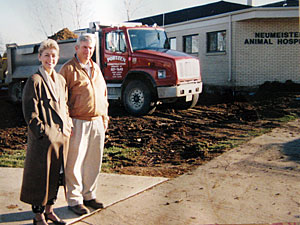Neumeister Animal Hospital was founded in 1951 by Dr. William C. Neumeister, who established the practice upon graduating from Iowa State University’s College of Veterinary Medicine. Dr. Neumeister was a World War II Navy veteran and part of the college’s first post-war graduating class.
Dr. Neumeister met Mary Helen Rode while stationed in Port Arthur, Texas. Mary Helen, a Latin scholar, majored in English and library science at the University of Mary Hardin Baylor. They married, and during Dr. Neumeister’s veterinary studies, Mary Helen taught first grade while beginning to raise their family.
Upon graduation, the Neumeisters settled in Dubuque, Iowa, opening their first animal hospital next to the Grove Drive-In, at the intersection of the then two-lane Highway 20 and University Avenue. At that time, JFK Road was gravel, and Kennedy Mall had not yet been built.
In 1960, as part of President Eisenhower’s Interstate Highway System initiative aimed at enhancing connectivity and national safety, the construction of the north lane of Highway 20 passed directly through the original hospital’s location. Through a land exchange with the Department of Transportation, Neumeister Animal Hospital relocated to its current site.
Initially, the practice provided veterinary care for a variety of animal species, with significant attention given to large animals. Its service area stretched from Buena Vista to Dickeyville, Wisconsin. Memorable moments from these early years included friendly footraces around the barn with young priests from New Melleray Abbey and even a visit to Taliesin to semen-test a bull owned by Frank Lloyd Wright’s widow.
The Neumeister family actively participated in the hospital’s daily activities. The three youngest children frequently assisted with kennel work on weekends, gaining firsthand experience with calving, administering intravenous medications, and participating in farmyard postmortem procedures alongside their father. The eldest son, Bill Neumeister, served as a medic in Vietnam before embarking on a 30-year career as a commercial salmon fisherman in Monterey Bay, California. He is now retired, with his last vessel, the Sun Ra II, being the largest wooden-hulled fishing boat on the West Coast.
Dr. William Neumeister significantly contributed to community health, serving as president of the Tuberculosis Society. Driven by personal experience—having lost four of his eight aunts and uncles to tuberculosis before age forty—he initiated tuberculosis testing among local students. His Aunt Pauline spent her final days at Dubuque’s Sunnycrest Sanatorium, further motivating his efforts.
Mary Helen Neumeister also made a lasting impact on the community. She was among three women who founded a program for battered women through the local YWCA, where she served on both the board of directors and trustees for many years.
In 2006, Neumeister Animal Hospital underwent substantial renovations and expansions. After thorough consideration, Dr. Neumeister selected the internationally renowned firm BDA Architecture, which specializes exclusively in veterinary facility planning and construction. Portzen Construction of Dubuque carried out the on-site work.
The renovation added 1,700 square feet, increasing the total hospital space to 6,700 square feet. Improvements included three new exam rooms, converting two smaller exam rooms into one large lift-table exam room, a new reception and waiting area, a special procedures room, dental suite, treatment room, isolation ward, and a 16-run boarding area. Post-surgical recovery was moved closer to treatment areas to ensure better patient monitoring.
The renovated hospital now features a quiet, naturally lit environment, with specialized ventilation creating three distinct air pressure zones, providing continuous fresh air circulation. These improvements significantly reduce stress for companion animals, who rely more on scent and sound than visual cues.
Today, Neumeister Animal Hospital proudly maintains exceptional standards of cleanliness and care, having received recognition from a State Animal Control Officer as “unsurpassed in cleanliness” during an annual inspection.

